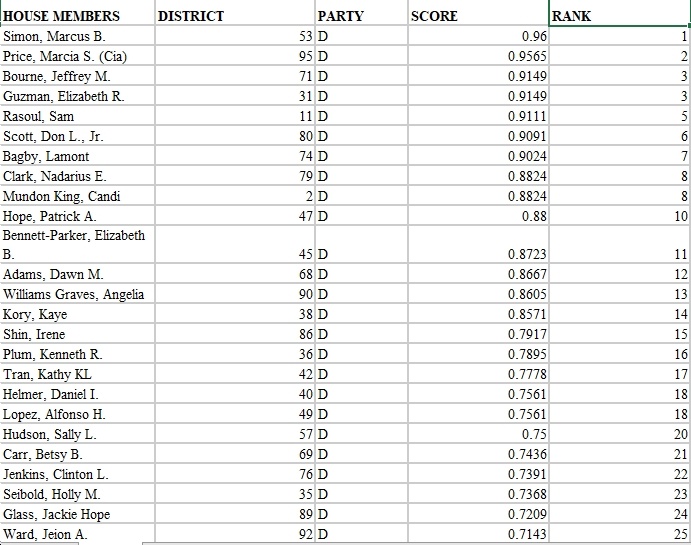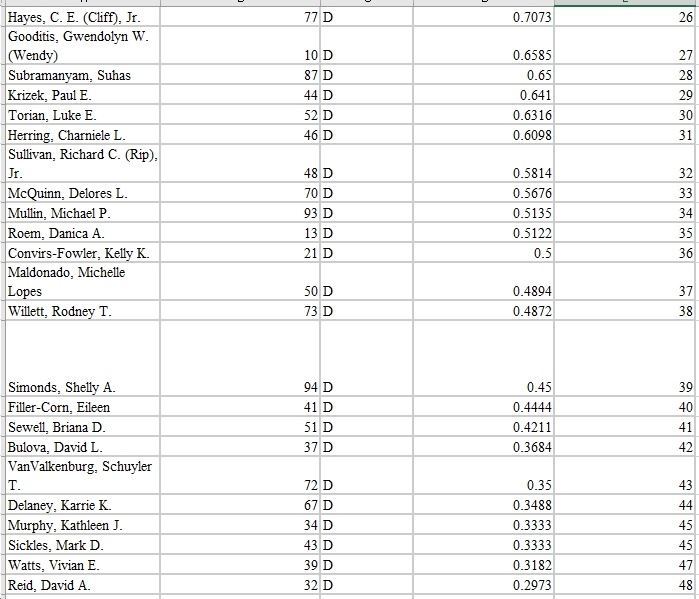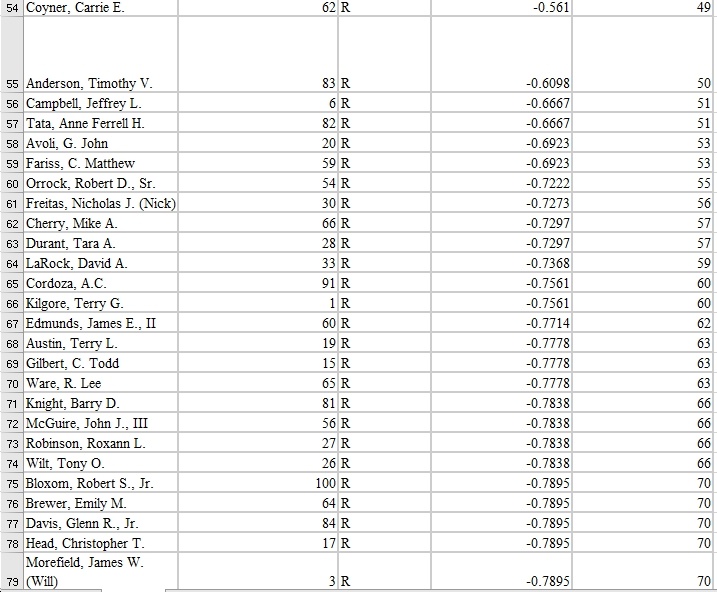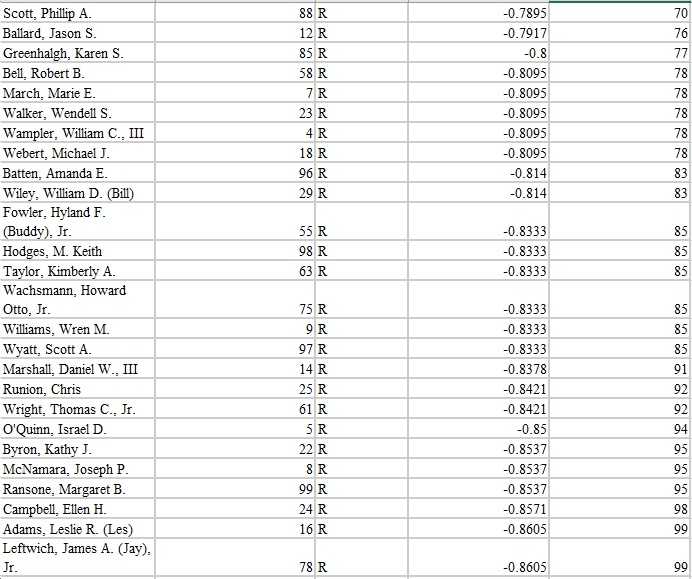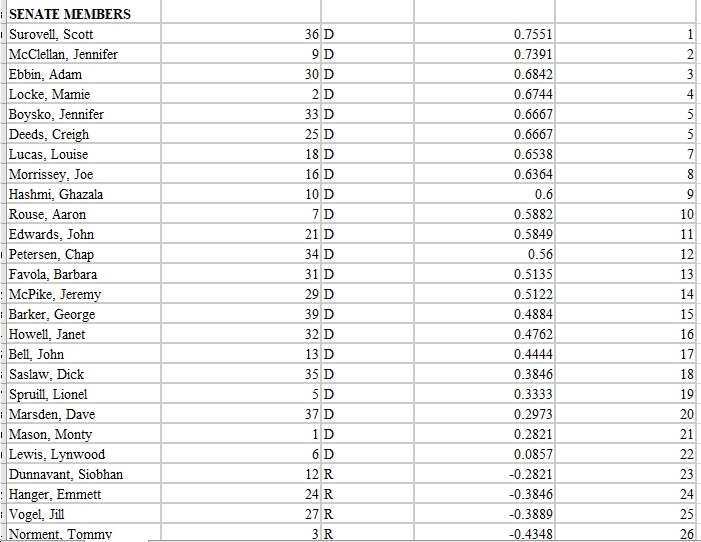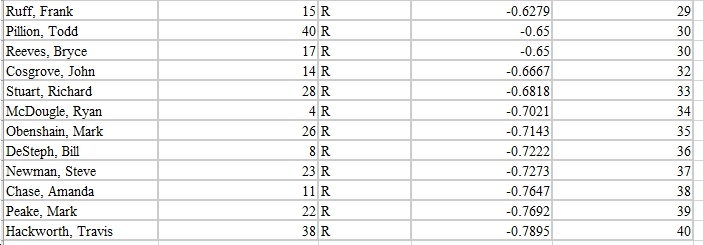by Cindy
With mixed control of the legislature and a looming general election for future control, much of the 2023 General Assembly session was unsurprising – and knowable from the start. House Republicans were going to kill most Democrats’ substantive bills and just pass out whatever bills they wanted to be able to crow about to voters—knowing fully well that Senate Democrats would block them after crossover. Still, a few good bills squeaked through with bipartisan support, and a few bad bills did as well.
It’s always fun to watch how legislators’ votes (and bill topics) change around in election years, as well as when control flips from one party to another. People facing primaries (or redistricted into bluer or redder seats) often have noticeably different performance from prior years. People vote differently when they’re in the minority and know bills won’t pass anyway than they do when the pedal hits the metal and they’re in the majority. *Some* leaders even refuse to docket bills to establish a 15-week abortion ban that they *claim* a majority of Virginians support and that their Governor has asked for!
Now that we’re doing our SIXTH (!) annual VAPLAN legislative scorecard, it’s fun to look at these trends. This year’s scorecard is calculated from the votes on 76 bills that came up this year, on topics from the environment, campaign finance reform, criminal justice, gun violence prevention, LGBTQ discrimination, and more. For every progressive vote a legislator cast on a bill (either in subcommittee, committee, or on the floor, depending on where the last vote was taken), they scored one point; for every non-progressive vote, -1. Additionally, we assigned plus or minus points for signaling intent to vote by co-sponsoring a bill.
While co-sponsorship doesn’t make a big difference in the outcome of bills, and we don’t take away points for *not* co-sponsoring good bills, we do award points here as a way to lower the inevitable penalty that legislators would otherwise suffer for not being on as many important committees, and thus not having as many opportunities to vote on bills. Any bill that the legislator had no vote on (either from abstaining, absence without recording intended vote, or from not being on the committee where the bill was voted on) is scored a zero. Finally, we award or subtract points to committee chairs for refusing to docket bad bills or good bills, respectively.
In most cases, points are based on the final vote on a bill. Where there are two identical bills (one in the Senate and one in the House), voting to allow either version of a bad bill to pass is what counts, even if the legislator voted no on the other version. Occasionally we make an exception to count the vote on a bill before it’s watered down, or the vote TO water it down—this year, we count the early vote on the version of HB2330 that included a two-day mandatory minimum sentence; the final version of the bill did not contain that, and was a better bill.
The hectic pace of the General Assembly session is always very obvious in the voting patterns. Legislators vote differently on the same bill a day later, sometimes even minutes later. Legislators sometimes change their votes after committee meetings, and sometimes when they didn’t attend and their vote was made by proxy. This is yet another reason that any scorecard, including and maybe especially this one (because of its scope), is an imperfect measure. It’s impossible to capture everything that happens in session—which legislators pipe up to point out flaws in bad bills, which ones water down good bills, which ones make mistakes and have to correct them, what mistakes go uncorrected.
We’ve pointed out the many caveats before (see here and here and here), but the one we most stress is that the exact rank isn’t precise, but within a range of a few ranks, the scorecard is more accurate. So, a legislator in the top ten is probably fairly progressive and noticeably different from one ranked 20th-30th, while the difference between the 7th and 8th ranked, for example, isn’t significant. With those caveats, we’re happy to announce, the 2023 VAPLAN scorecard results!
Progressive champions:
- Delegates Marcus Simon, Cia Price, Elizabeth Guzman, Jeffrey Bourne, Sam Rasoul, and Don Scott were the most progressive legislators in the House this year.
- Senator Scott Surovell, now-Congresswoman Jennifer McClellan, and Senators Adam Ebbin, Mamie Locke, Creigh Deeds, and Jennifer Boysko topped the scorecard in the Senate.
Least progressive Democrats:
- Delegates David Reid, Vivian Watts, Kathleen Murphy, Mark Sickles, Karrie Delaney, Schuyler VanValkenburg
- Senators Lynwood Lewis, Monty Mason, Dave Marsden, Lionell Spruill, Dick Saslaw, John Bell
Highest-scoring Republicans:
- Delegates Carrie Coyner, Tim Anderson, Jeffrey Campbell, Anne Tata, Matt Fariss, John Avoli were the most “moderate” (relatively speaking, as they’re all VERY conservative by almost any standard) Republicans in the House.
- Senators Siobhan Dunnavant, Emmett Hanger, Jill Vogel, Tommy Norment, Bill Stanley, and David Suetterlein were the most “moderate” (again, relatively speaking, as they’re all VERY conservative by almost any standard) Republicans in the Senate.
